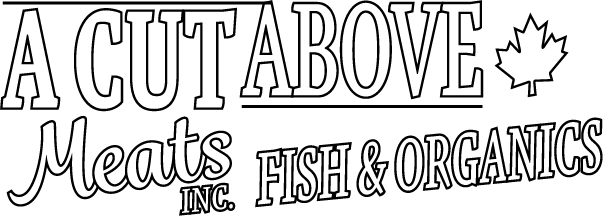Organic Pasture Raised Chicken
"Organic" chicken and other buzzwords
The poultry industry is filled with confusing buzzwords.
With terms like "organic," "free-run," "free-range," "pesticide-free," and "cold-chilled" being constantly thrown around, it can be difficult for consumers to make the right choices on what kind of chicken to eat.
Without a basic understanding of what these words mean, consumers cannot choose meat that is sustainable, ethically raised, and good for their health.
So come with us as we peck away at the meaning of these terms and educate you on choosing the best-quality poultry.
What is organic?
To start off, chicken that is labelled "organic" are raised to specific standards laid out by both the Canadian General Standards Board and a reputable organic certification board.
The standards vary from province to province, but generally, organic chickens are raised with certified organic feed that contains no animal by-products or antibiotics.
All the chicken that A Cut Above Meats sells comes from Fenwood Farm, located in Ancaster, Ontario, just south of Hamilton.
Fenwood Farm raises two types of chickens - organic and raised Without Antibiotics (RWA). Organic means that the chickens are only fed organic, non-GMO gains, while RWA means the birds are not fed organic grains, but are completely free of antibiotics.
We'll get into antibiotics later on, but for now, let's talk about two terms that people often get mixed up.
Free-run versus free-ranged
Virtually all chickens in Canada are raised in what is known as free-run conditions, meaning they can roam around freely within a barn, but do not have access to the outdoors.
While free-run chickens do live better lives than caged ones, these conditions are still not ideal. Thousands of these birds live in cramped barns with virtually zero access to natural sunlight.
Barns can have poor air quality and litter quality, leading to respiratory issues and poor foot health for the birds. And the stress of poor air quality and lighting, high stocking density and the inability to perform natural behaviours can lead chickens to engage in feather pecking and cannibalism.
Meanwhile, all A Cut Above Meats chicken is free-range, meaning the birds can access the outdoors. At Fenwood farm, these birds have free access to natural grass and sunlight, while being protected from predators by a wire fence. Because free-range chickens are given the opportunity to forage for food in a natural environment, their meat is tastier and has a more diverse nutrient profile. What's good for the birds is also good for the humans that eat them!
Antibiotic-free
The term "antibiotic-free" is easy enough to understand, but why would someone choose to eat chicken that hasn't been put on these medications? After all, nobody wants to eat sick, unhealthy birds.
In their natural state, chickens wander around their surroundings, pecking at feces and other sources of microbes in the natural world. In turn, this builds up their antibodies and strengthens their immune system.However, this is not possible from the confines of a wire cage or from inside a warehouse. So to keep the chickens from prematurely dying of disease (and keep profits high) farmers are forced to give them antibiotics.
This has its downsides. The overuse of antibiotics is leading to a global crisis of antibiotic-resistant bacteria. Antibiotic use in animals may raise the risk of transmitting drug-resistant bacteria to humans, making it more difficult to treat bacterial infections and illnesses.
Anytime we eat animals that have been given antibiotics, we risk exposure to drug-resistant bacteria. That's why many health-conscious people choose to eat free-range birds that have been able to naturally build up their immune systems. Water-chilled and cold-chilled
Two more key terms set apart traditional store-bought chicken, and those sold by A Cut Above Meats' poultry. And those are water-chilled and cold-chilled.
Most chicken, after being slaughtered, is water-chilled. This means the chicken is cooled down by soaking in a big tub of cold, chlorinated water.
While this process saves a lot of time, it has three main drawbacks. It uses a huge amount of energy, it leads to the chicken becoming dried out and chewy when you cook it, and you end up paying for all the added water in the chicken!
Meanwhile, our chicken is air-cooled, meaning the birds are placed into high-tech chambers where they are sprayed with blasts of cold air. This process is more energy-efficient, saves you money, and has even been demonstrated to reduce potentially harmful bacteria by 80%.
See the difference in quality for yourself
If you are concerned about animal welfare, want to consume meat that is better for your health, or if you don't want to pay extra for lower-quality food, then our chicken is a fantastic option.
Our poultry farmers use an exclusive feed blend of 100% organic, pesticide and herbicide-free grains, and our chickens are raised in a year-round free-run environment with access to natural sunlight and clean well water.
We offer a wide range of organic chicken products, such as drumsticks, legs, wings, breasts and thighs.
Order a box and see the difference that quality can make!
